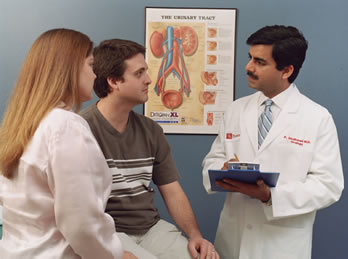When you are dealing with any problems of the urinary tract or the male reproductive organs, you might want to turn to a urologist. What does a urologist do? In addition to these basic issues, they deal with a span of patient ages – everyone from children to the elderly might need their help. Therefore, they must have a working knowledge of pediatrics, gynecology, internal medicine, geriatrics and more. Since the urologist often performs surgery, it is considered a surgical specialty.
What Does a Urologist Do?

A urologist is a physician specialized in diseases associated with the urinary tract and the reproductive system in men. Usually, people with a urological compliant should visit their GP first. It is only when the disease turns out to be complex or rare, and difficult to treat that you would be referred to a urologist.
To answer “what does a urologist do,” we have to look at the span of patient experience. It begins with a thorough examination, including a physical exam, family history, blood or urine tests, x-rays, and the like, depending upon the complaint.
Once the diagnosis is made, treatment can begin. This is discussed with the patient to ensure everyone is on the same page. Sometimes no treatment is necessary, other than home remedies. But in some cases, medication might be required; in more severe cases the urologist might perform surgery.
Finally, the urologist also works to prevent problems in the first place. For instance, cancer tumors that are discovered early can lead to an easy treatment plan that might not involve chemo therapy or radiation. Urologists will often screen for such problems so that they can catch them before they become a bigger issue for the patient. Urologists can screen your urine or blood, look at x-rays, and perform rectal examinations to help rule out any potential problems.
What Disease Can a Urologist Treat?
When asking “what does a urologist do,” remember that their work covers a wide scope of issues. There are many things that a urologist treats. Here are just a few:
- Kidney stones (including prevention, management and surgery)
- Urinary tract infections, obstructions and more
- Prostate problems, including urinary retention
- Certain types of cancer, including rectal, bladder, adrenal, testicular or prostate cancers
- Erectile dysfunction or impotence, premature ejaculation and other sexual issues
- Low testosterone level in men
- Infertility
What to Expect During a Visit to the Urologist
After filling out the forms and paperwork required for your visit, you will be asked to provide a urine sample – so make sure your bladder is full when you get there. You will give a detailed medical history of both yourself and your family, any mediations you are taking, your symptoms and their severity or duration, and other questions that are pertinent to the problems at hand.
A physical examination will be done. The exam might be a full physical examination, or it might focus on the genital area. A pelvic exam might be done for females, and a rectal exam might be done for men. This exam will be the first step in establishing a baseline of health and figuring out what your condition might be.
After the physical examination, the doctor will discuss what might be wrong and potential treatments. In order to figure out what is really happening, other tests might need to be performed. These might include imaging examinations, such as an MRI or ultrasound, as well as extensive urine or blood tests. These tests might focus on a particular issue, such as looking at PSA levels that might determine prostate cancer, or they might be wide-ranging, such as an x-ray of the pelvis to look for any masses there.
If anything is found on those images or in the bloodwork, further tests might be performed, such as urodynamics to assess bladder function, a kidney profile to look at how well they are working, or a biopsy that might determine whether a tumor or worrisome mass is malignant or benign.
When it comes to “what does a urologist do?” the answer really depends upon your situation. For you, a urologist might simply test your urine and give you good news. But for someone else, a urologist might be with them every step of the way through difficult cancer treatment.
